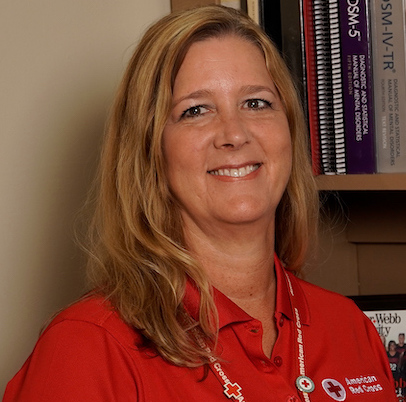
By: Bruce Jenks
North Carolina Red Cross volunteer, Sharon Webb, is a Mental Health Lead, Disaster Mental Health Chief, and Service to Armed Forces (SAF) Facilitator. Helping others build resiliency is a common theme of Sharon's service. Sharon recalls her very first SAF facilitation.
"It was for an Army National Guard unit who had just returned from Iraq, and they were an explosive ordinance unit. Their sergeant did not make it back with them, so that was very impactful. The conversations were deep. We talked about how to reconnect with family members and healthy ways as they took care of themselves. So that had a very significant impact on me."
Sharon, a Red Cross volunteer for 25 years, holds a Ph.D. in counselor education and supervision, specializing in trauma and crisis. Along with volunteering for the Red Cross, Sharon is an associate professor at a local university and a licensed professional counselor supervisor. Sharon's family has deep ties to the service member community: her father was a marine, her stepfather served in the navy, her son recently decided to become a marine, and she was an army wife for 14 years.
Sharon has deployed over 30 times to disaster and SAF responses. One of Sharon's most impactful disaster mental health responses was following the 2015 shooting at the Emanuel African Methodist Episcopal Church in Charleston. As Sharon recalled, at the time, the news was full of stories about racial tension; however, what she saw was very different. She saw a community come together, visibly demonstrated when 20,000 people joined hands across the Arthur Ravenel Bridge.
In contrast to long-term clinical counseling, the rewards for Sharon as a mental health volunteer are immediate, "I feel like I always take away more than any little tidbit that I can give of my time." For example, SAF extends to family members who are caregivers to veterans. These caregivers appreciate that the Red Cross cared enough about them and what they were experiencing to help them.
Looking forward, Sharon will be stepping into the role of resiliency leader for the newly combined North Carolina region. She encourages mental health providers and counselor educators to reach out and explore the opportunities to serve. Although it might seem like a lot to make time in a busy professional schedule to volunteer, the deep appreciation of the clients is immediate and impactful.
"Whether it's service to armed forces or disaster mental health, every single response, every story is important, is significant and impacts us in some way."
Support all the urgent humanitarian needs of the American Red Cross.
Find a drive and schedule a blood donation appointment today.
Your time and talent can make a real difference in people’s lives. Discover the role that's right for you and join us today!